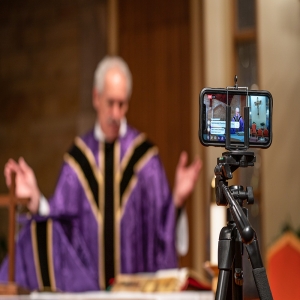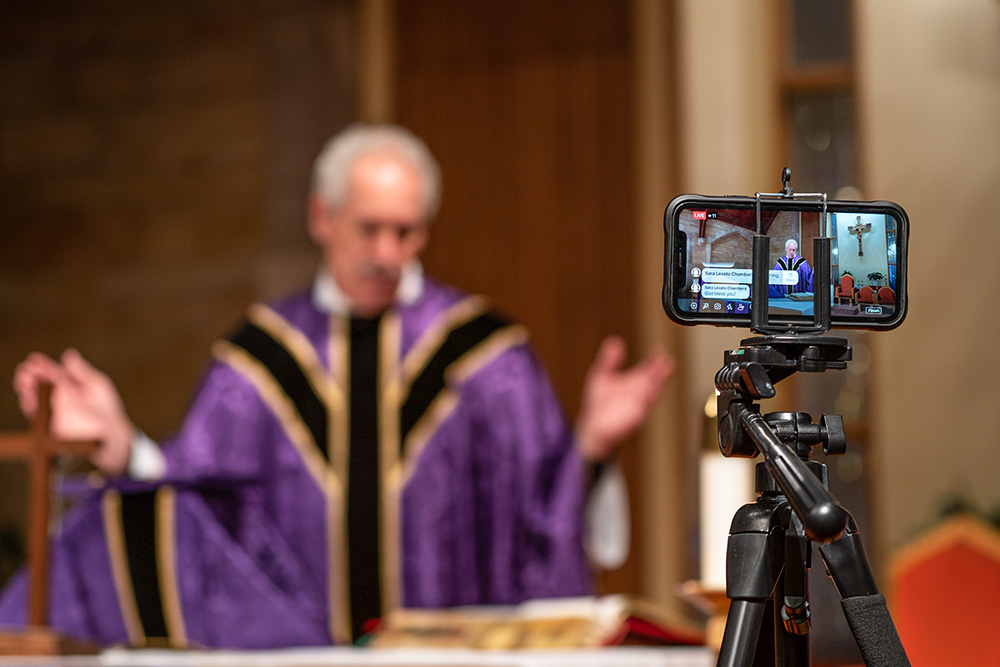
.jpg) Joe Eruppakkatt
Joe Eruppakkatt

The Digital Age: New Opportunities for Pastoral Care
The digital age presents opportunities previously unavailable to pastors, making pastoral care more accessible and efficient. Digital platforms now allow priests and bishops to reach out to people with unprecedented speed and precision. These technologies support pastoral governance, organisation, evangelisation, faith formation, internal communication, administration, and maintaining connections within a parish, diocese, or the entire Church. For example, a death announcement can reach every home within seconds via a WhatsApp group, and reflections on the Word of God shared on social media can be as impactful as sermons preached from the pulpit – if not more so.
The Internet also enhances the Church's synodal dimension. As the final document of the XVI General Assembly of the Synod of Bishops for a Synodal Church notes:
"The spread of digital culture, particularly evident among young people, is profoundly changing their experience of space and time; it influences their daily activities, communication, and interpersonal relationships, including faith. The opportunities that the Internet provides are reshaping relationships, bonds, and boundaries. Nowadays, we often experience loneliness and marginalisation, even though we are more connected than ever… The Internet, constituted as a web of connections, offers new opportunities to better live the synodal dimension of the Church."
The Challenge: Presence and Authentic Encounter
Despite these opportunities, the digital age also poses significant challenges to authentic pastoral care, foremost among them the lack of real presence.
"Virtual reality is no substitute for the Real Presence of Christ in the Eucharist, the sacramental reality of the other sacraments, and shared worship in a flesh-and-blood human community. There are no sacraments on the Internet; and even the religious experiences possible there by the grace of God are insufficient apart from real-world interaction with other persons of faith" (Doctrinal Document 9; Pontifical Council for Social Communication, 2002).
This is equally true for the personal presence of a pastor among his people. No amount of online communication can replace the personal presence and interaction of a priest who walks with his community as a true shepherd. Over-reliance on digital communication risks prioritising technical knowledge over authentic human relationships, which are essential for personal encounters. The presence of a bishop or priest with the heart of a shepherd adds 'soul' to his communication, in contrast to mechanical communication lacking warmth. A pastor's real encounter with his people leads to their encounter with Christ, which is the ultimate aim of evangelisation.
Bishop Malcolm Sequeira: Knowing His Flock
Bishop Malcolm Sequeira of Amravati, in a recent address to seminarians and formators at Jnana Deepa (JD) Institute of Philosophy and Theology, Pune, shared that he had visited 95% of the families in his diocese within a single year of assuming office – a remarkable testament to his dedication and intimate knowledge of his flock. He exemplifies a shepherd who knows his sheep, calls them by name, and leads them to fresh waters and green pastures. In his words:
"As we visit them in their homes, we understand the real plight of the people. Many of them live in extreme poverty, struggle to make ends meet, and face manifold problems and challenges. When we meet them in church on Sundays, they appear in their best, concealing their poverty, misery, and other challenges they encounter in daily life. But when we meet them at home, we can know the real problems they face."
He urged seminarians and their formators to move beyond the comfort of the seminary campus and enter the villages, shantytowns, and homes of the people they are called to serve.
Pope Francis: Shepherds with the Smell of the Sheep
From the beginning of his pontificate, Pope Francis has urged priests to be "shepherds living with the smell of the sheep," emphasising closeness to and understanding of their communities (Chrism Mass, March 28, 2013). He repeatedly calls for pastors to reach out to the "existential peripheries" or "margins of society," engaging actively with those who are marginalised, forgotten, or on the fringes. This call is rooted in the Gospel and the Church's mission to bring Christ's love and mercy to all, especially those most in need, through personal presence.
During his General Audience on November 29, 2023, Pope Francis said:
"Apostolic zeal is never a simple repetition of an acquired style, but testimony that the Gospel is alive for us here today. Aware of this, let us therefore look at our age and our culture as a gift. They are ours, and evangelising them does not mean judging them from afar, nor standing on a balcony and shouting out Jesus' name, but rather going down to the streets, going to the places where one lives, frequenting the spaces where one suffers, works, studies and reflects, inhabiting the crossroads where human beings share what has meaning in their lives."
Pope Leo XIV: Walking with the People
Pope Leo XIV, drawing from his experience of leaving the comfort of his suburban Chicago home for the poverty-stricken Peruvian villages, exemplifies this pastoral approach. His nearly two decades of service in Peru, from 1985 to 2003 and again from 2014 to 2023, demonstrates his commitment to understanding and serving the people. Fr Prevost, later Bishop Prevost, worked alongside the local population, founding parishes and communities and accompanying them through the darkest moments of Peruvian history, including civil war and the brutality of a dictatorship. He fought for human rights, challenged the dictator, and played a key role in ministering to the people during the COVID-19 pandemic, bringing them medicines, food, and even Holy Communion. He also extended support to Venezuelan migrants and advocated for the care of the environment. He truly "smelled of the sheep" he tended with such love and commitment.
Addressing the Italian Bishops on June 17, 2025, Pope Leo XIV said:
"The Lord sends us into the world to bring his same gift: 'Peace be with you!' and to become its creators in everyday life. I am thinking of parishes, neighbourhoods, areas within the country, the urban and existential peripheries. Here, where human and social relationships become difficult, and conflict takes shape, perhaps subtly, a Church capable of reconciliation must make herself visible (Rom 12:18).… No one can prevent you from being close to the people, sharing life, walking with the last, serving the poor. No one can prevent you from proclaiming the Gospel, and it is the Gospel that we are invited to bring, because it is this that everyone, ourselves first, need in order to live well and to be happy."
The Good Shepherd: The Ultimate Model for Pastoral Care
Jesus, the Good Shepherd, revealed his profound relationship with his followers:
"I am the good shepherd. I know my own and my own know me, just as the Father knows me and I know the Father; and I lay down my life for the sheep" (John 10:14-15).
It reveals not only his intimate knowledge of each individual but also his readiness to sacrifice his life for them. His leadership is based on love, care, compassion, mercy, and protection—sharing in the experiences and feelings of his flock.
The Call for Authentic Presence
At its core, pastoral care is a shepherding ministry focused on spiritual guidance, support, and leadership. It means offering people comfort, encouragement, and assistance in times of difficulty and sometimes even meeting their physical needs. Pastoral leaders are called to lead by example, with love, understanding, and empathy.
In the digital age, people need pastors who are not only proficient in communication media but, more importantly, who walk with their flock, listen to their struggles, and engage with them both in real life and through digital platforms. People need pastors who reach out to the needy, the wayward, the aged, the sick, and the struggling — not just through WhatsApp and social media, but with genuine presence.
Today, more than ever, people need pastors who listen to the cries from their homes, communities, and church precincts rather than those who only preach from the pulpit or through YouTube and then retreat to the comfort of their residences. Ultimately, people need pastors who lead them to the green pastures of the Word of God and the fresh waters of the sacraments through real, personal, caring, and compassionate presence.